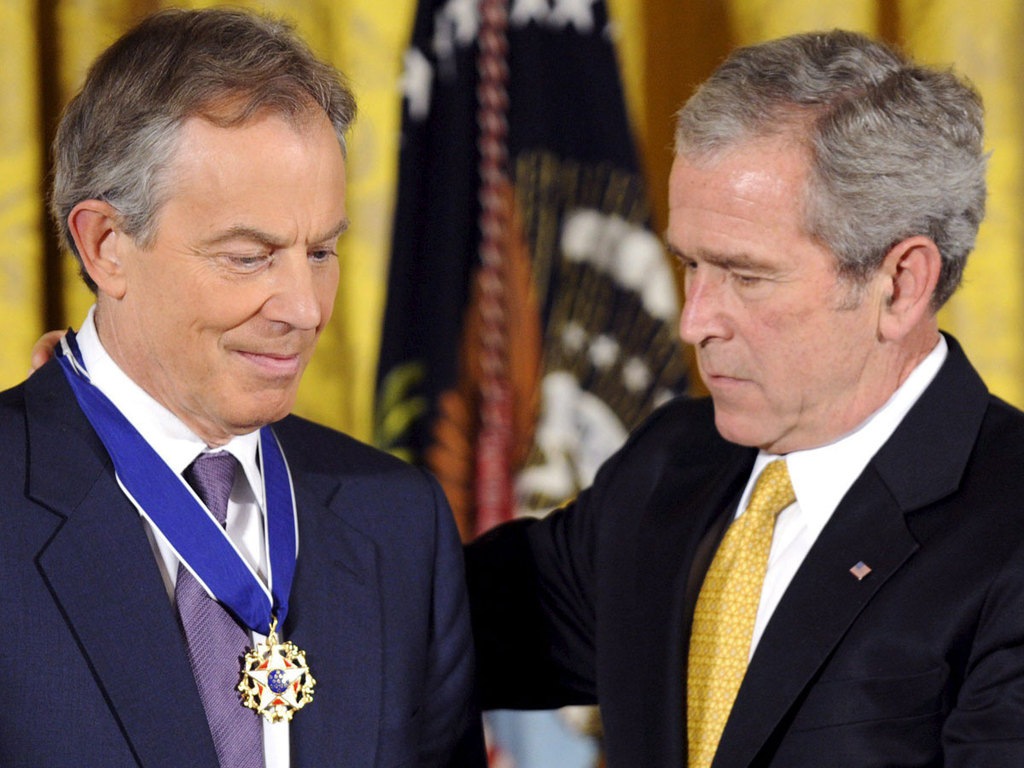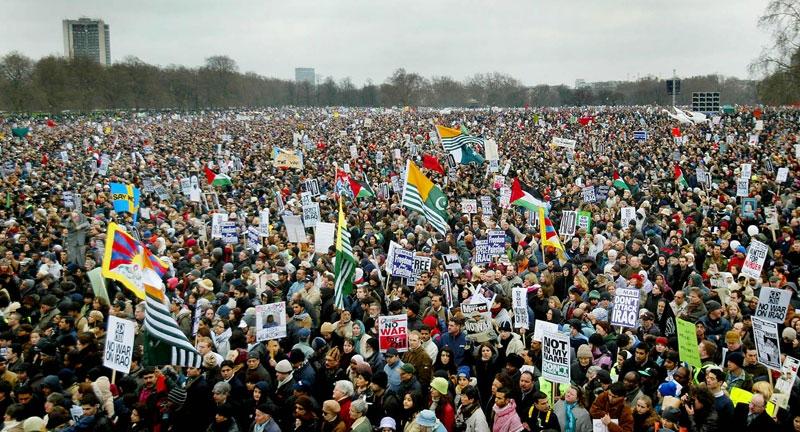Invading Iraq is what we did instead of tackling climate change
Original article well said by Adam Ramsay republished from openDemocracy under a Creative Commons Attribution-NonCommercial 4.0 International licence.
OPINION: Instead of launching a war, the US and UK could have weaned us off the fossil fuels that pay for the brutal regimes of dictators

Twenty years ago today, [20 March] war was once again unleashed on Baghdad. In the UK – and much of the rest of the world – people sat in front of their TVs watching the skies above the ancient city flash with flame as buildings were rendered to rubble, the limbs and lives inside crushed.
The real victims of George Bush and Tony Blair’s shock and awe were, of course, the people of Iraq. Estimates of violent deaths range from a hundred thousand to a million. That doesn’t include the arms and legs that were lost, the families devastated, the melted minds and broken souls, trauma that will shatter down generations. It doesn’t include anyone killed in the conflict since then: there are still British and US troops in the country. It doesn’t include the poverty resulting from crushed infrastructure, the hopes abandoned and the potential immolated.
And that’s just the 2003 war: Britain has bombed Iraq in seven of the last 11 decades.
But in far gentler ways, the war was to shape the lives of those watching through their TVs, too. The invasion of Iraq – along with the other post-9/11 wars – was a road our governments chose irrevocably to drive us down. And we, too, have been changed by the journey.
The financial cost of the Iraq war to the US government, up to 2020, is estimated at $2trn. The post-9/11 wars together cost the US around $8trn, a quarter of its debt of $31trn. Much of the money was borrowed from foreign governments, in a debt boom which, some economists have argued, played a key role in the 2008 crash.
It was in this period, in particular, that China bought up billions of dollars of US government debt. Just before Barack Obama was elected in 2008, Beijing had overtaken Tokyo as the world’s largest holder of US Treasury bonds. Today, America’s neoconservatives are obsessed with China’s power over the US. What they rarely mention is that this was delivered by their wars in Iraq, Afghanistan and Pakistan.
Britain’s financial contribution was more meagre – in 2015 the UK government estimated it had spent £8.1bn on the invasion of Iraq, and around £21bn on Afghanistan. But these are hardly figures to be sniffed at.
Also significant, in both cases, is where this money went: the Iraq war saw a revolution in the outsourcing of violence. In 2003, when the war began, the UK foreign office spent £12.6m on private security firms. By 2015, just one contract – paying G4S to guard Britain’s embassy in Afghanistan – was worth £100m.
Over the course of the wars, the UK became the world centre for private military contractors – or, to use the old fashioned word, mercenaries. While many of these are private army units, others offer more specialist skills: retired senior British spooks now offer intelligence advice to central-Asian dictators and, as we found out with Cambridge Analytica during the Brexit vote, psychological operations teams who honed their skills in Iraq soon realised how much money they could make trialling their wares on the domestic population.
This vast expansion of the military industrial complex in both the US and UK hasn’t just done direct damage to our politics and economy – affecting the living standards of hundreds of millions of people across the world. It has also distorted our society, steered investment into militarised technology when research is desperately needed to address the climate and biodiversity crises.
Similarly, the war changed British politics. First, and perhaps most profoundly, because it was waged on a lie, perhaps the most notorious lie in modern Britain, that Saddam Hussein had weapons of mass destruction.
Acres of text have been written about the rapid decline in public trust in politicians in the UK in recent years. Very few grapple with the basic point – that, within the memory of most voters, a prime minister looked us in the eye, and told us that he had to lead us into war, based on a threat that turned out to be fictional. There are lots of reasons people increasingly don’t trust politicians – and therefore trust democracy less and less. But the Iraq war is a long way up the list.
Obama – who had opposed the war – managed to rally some of that breakdown of trust into a positive movement (whatever you think of his presidency, the movement behind it was positive). So did the SNP in Scotland.
But often, it went the other way. If the war hadn’t happened, would Cleggmania have swung the 2010 election from Gordon Brown to David Cameron? Probably not. And this, of course, led to the second great lie of modern British politics, the one about tuition fees and austerity.
Without the invasion, would Donald Trump have won in 2016? Would Brexit have happened?
There is a generation of us – now approaching our 40s – who were coming into political consciousness as Iraq was bombed. Many of us marched against the war, many more were horrified by it. The generation before us – Gen X – were amazingly unpolitical. Coming of age in the 1990s, at the end of history, very few got involved in social movements or joined political parties.
When I was involved in student politics in the years following Bush and Blair’s invasion, student unions across the UK were smashing turnout records. Soon, those enraged by the war found Make Poverty History, the climate crisis, the financial crisis and austerity. A generation of political organisers grew up through climate camps and Occupy and became a leading force behind Bernie Sanders and Jeremy Corbyn, helping organise a magnificent younger cohort of Gen-Zers which arrived after us.
But I shouldn’t end on a positive note. The disaster predicted by the millions across the world who marched against the war has played out. Hundreds of thousands have died. The Middle East continues to be dominated by dictators.
This war was justified on the grounds that Saddam was a threat to the world. But while his weapons of mass destruction were invented, scientists were already warning us about a very real risk; already telling us that we had a few short decades to address the climate crisis.
Rather than launching a war that would give the West access to some of the world’s largest oil reserves, the US and UK could have channelled their vast resources into weaning us off the fossil fuels that pay for the brutal regimes of dictators. Instead, we incinerated that money, and the world, with it.
Original article well said by Adam Ramsay republished from openDemocracy under a Creative Commons Attribution-NonCommercial 4.0 International licence.
